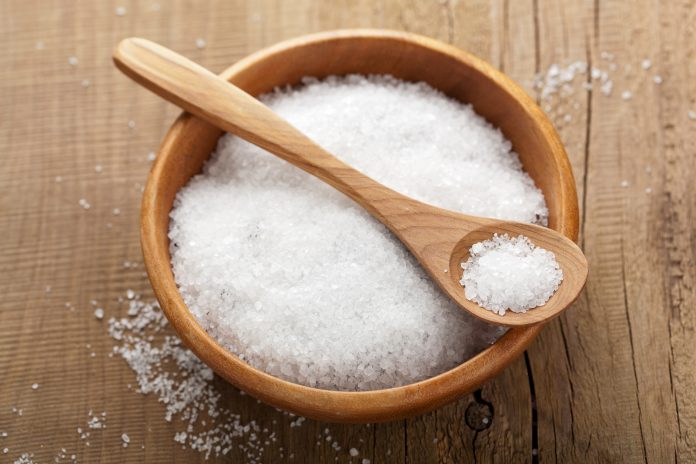Many cafe goers are huge salt consumers and we respect that. But to help you feel better or worse about what you’re consuming, we asked DR PETER DINGLE, author of My Dog Eats Better Than Your Kids, to put a few salty facts on the public record from a scientific perspective
Is salt the real problem that it is made out to be? It seems that by oversimplifying the information on salt and its relationship to health we complicate what is a really simple and important issue. After reviewing more than 100 scientific papers it became clear that salt is not the public enemy that it is made out to be, rather it appears to be an imbalance of minerals as a result of eating processed foods. And some very simple changes can make a lot of difference. This does not mean you go out and lather salt on all your food and justify it from my article, instead it means back to some common sense dietary changes.
Salt, in the form of sodium chloride, has been consumed by humans since the late Palaeolithic period, when it was used to preserve and flavour food. In modern times, however, some very limited studies and an incomplete understanding of nutrition have led to salt being labelled “public enemy number one” when it comes to blood pressure and cardiovascular disease. But is salt really so bad?
 Salt in the human diet has been the subject of a great deal of research. Health professionals have, for many years, recommended reduction or even elimination of salt intake. This is mainly due to findings that link the excessive salt in the modern human diet to health problems such as high blood pressure. Yet it would be shortsighted to simply accept or reject such recommendations, as there are other factors involved requiring further investigation.
Salt in the human diet has been the subject of a great deal of research. Health professionals have, for many years, recommended reduction or even elimination of salt intake. This is mainly due to findings that link the excessive salt in the modern human diet to health problems such as high blood pressure. Yet it would be shortsighted to simply accept or reject such recommendations, as there are other factors involved requiring further investigation.
Salt intake is widely recognised by public health and medical organisations as the leading cause of blood pressure disparities (1). However, it is simply not valid to state that reducing salt intake will lower our prevalence of hypertension; the truth is that a number of factors, including lifestyle and nutrition, play an important role.
Sodium
Sodium is essential for many functions in the human body. The average human body contains around 90 grams of sodium, most of which is in the fluids that surround cells, some in bones and the rest retained in the cells (2). Sodium is passively absorbed and hence excess intakes are easily achieved. Sodium is excreted mainly by the kidneys; therefore a high sodium intake must be balanced with a large intake of water and other fluids. Sodium is the main component of the body’s extracellular fluids; it helps carry nutrients into and waste products out of the cells, regulates body functions such as blood pressure and fluid volume and works on the lining of blood vessels to keep the pressure balance normal (3). So you can see it is pretty important.
Chloride (Cl), the other half of the salt molecule (NaCl), is just as important as sodium yet often ignored. Chloride is essential for the production of hydrochloric acid, which is necessary to digest proteins in the gut and is essential for destroying bacteria and other potentially toxic microbes.
How Much Salt?
In terms of the adequate amount of daily intake of salt, various organizations, including the National Academy of Sciences’ Institute of Medicine, have published recommendations for daily sodium intake between 1,500 milligrams (mg) and 2,400mg per day for healthy adults (4).
The main regulators of sodium levels in the body are the kidneys. If sodium levels drop too low, the hormone aldosterone is released and this increases the amount of sodium held in the body by reducing the amount lost in urine. Excessive sodium loss is very rare, but low sodium levels in the body can be dangerous if not treated. Some people do not get rid of enough sodium through their urine; this causes the body to retain water, resulting in swelling of the body and, with the increased blood and fluid volume, in turn causes high blood pressure (5). The high blood pressure puts a strain on the heart, which must work harder to pump the increased volume of blood (Fox 2007). This is one reason that many health professionals recommend a reduction of salt intake—to reduce the risk of excess sodium in the blood; they believe that lower sodium intake has a beneficial effect on blood pressure. Thus people with existing hypertension and kidney disease may benefit from a reduction in salt intake.
Health Problems
While there is evidence to suggest that salt plays a role in hypertension, it is a bit simplistic to target salt and ignore information that contradicts this. It is critical that we assess all the information available. It is important to take a multidimensional approach and look at the whole body. The increase in blood pressure as a result of increased salt intake may be due to the human kidney’s inability to excrete large amounts of waste (6,7,8). Results from various studies—including epidemiological, animal and migration studies as well as randomised trials—support the claim that as dietary salt increases, blood pressure increases (6). However, in humans at least, individuals seem to vary significantly in how they tolerate salt. Some people appear to be salt sensitive or have certain conditions that predispose them to hypertension.
High dietary salt intake in some individuals has been shown to contribute to cardio vascular conditions including the incidence of stroke (9). Research has found that individuals with a high salt sensitivity (in particular those with hypertension) have an increased risk of cardiovascular disease and death (10). High dietary salt intake can increase the risk of osteoporosis because of high urinary calcium excretion. In particular, it has been found that individuals with hypertension excrete high levels of calcium in their urine (11,12). However, provided that intake of calcium and potassium are at recommended levels, the risk of osteoporosis is low (13).
Salt is not the problem
So what is the problem? Research dating back to 1964 contradicts the simplicity of the link between salt and hypertension (14). In one study, a significant blood pressure decline was observed as a result of acute dietary salt increase (14). While limited studies of salt levels and blood pressure support the salt-hypertension link, the data are somewhat contradictory (14-23). It appears that this link affects only those with existing health conditions, not healthy persons. The question that remains is whether beneficial hypertensive effects of sodium restriction will outweigh its hazards.
Inadequate salt intake has also been associated with undesirable metabolic situations such as alteration in plasma lipoproteins and inflammation (24), a potential increase in cardiovascular stress, and increased serum cholesterol, triglycerides and insulin resistance (25). Contrary to common belief, the effects of low-salt diets — the unfavourable effects on blood coagulation, inflammatory and metabolic disturbances — outweigh the benefits of lowered blood pressure (Nakandakare et al. 2008). One study found that low-salt diets can actually cause harm to people with high blood pressure (26,27). So too little salt has greater adverse effect on health than too much salt. Epidemiological evidence suggests that a reduction in salt can decrease the risk of coronary disease significantly for overweight patients (28); however, low-salt diets are not warranted in patients with normal blood pressure (24).
Many studies show that hypertension is not related solely to dietary salt intake but to other factors such as a sedentary lifestyle, alcohol consumption, protein intake and lack of potassium, calcium and magnesium (29,30,31). The most realistic strategy for preventing and treating hypertension is not focusing on one risk factor but instead on a combination of interventions to reduce a number of risk factors (30). A proven effective intervention is Dietary Approaches to Stop Hypertension (DASH), which is a diet rich in fruit and vegetables, therefore rich in potassium, magnesium and other minerals (30,32). Not only has the DASH diet shown a beneficial effect on lowering blood pressure but also it is accompanied by the benefits of cholesterol-lowering and high antioxidant content, which could improve overall health and lower the risk of other diseases (32).
Studies indicate that only about 12% of subjects in a society with a high salt intake (eight grams to 12 grams of salt per day) will become hypertensive (33). According to a Tufts University research group (1997), only people with high blood pressure should be advised to limit sodium. Data from several large studies show that when adults meet or exceed the recommended dietary allowance of calcium, potassium and magnesium, the simultaneous ingestion of a diet high in sodium chloride is not associated with high blood pressure (34).
Overall there is only a weak relationship between dietary salt intake and high blood pressure in the general population (10). The effects of dietary salt on blood pressure are governed by “salt sensitivity” of individuals where large blood pressure changes can occur due to varying levels of salt intake (Franco and Oparil 2006). To compound the issue, research shows that sodium reduction in younger people frequently results in increased blood pressure, whereas those over 45 generally experience decreased blood pressure when sodium intake is restricted (34,35). Diet can also affect the response of dietary salt intake on blood pressure. An appropriate diet and a high potassium intake can curb the rise in blood pressure associated with an increase in dietary salt intake (10,37). More than 25 separate studies show that increasing potassium intake (without decreasing sodium) is an effective way to lower blood pressure. One of those studies demonstrated that with just one daily serving of a potassium-rich food the risk of death by stroke may be cut by as much as half (21). So why don’t we take this approach?
An eight-year study found those on low-salt diets had more than four times as many heart attacks as those on normal-sodium diets—the exact opposite of what the “salt hypothesis” would have predicted (38). Scientists at the University of Toronto concluded that limiting salt in the diet has no effect on people with normal blood pressure. In another study, 269 medical students were tracked; about 50% had no change in blood pressure when salt intake was increased by 12 times (39). Half of the remainder had a rise in blood pressure and the other half experienced a drop in blood pressure.
Data from the National Health and Nutrition Examination Survey found that individuals with the lowest sodium intake had a 20% higher chance of dying from a cardiovascular cause than individuals with the highest sodium intake (40). An earlier study also found an independent relationship between levels of sodium measured in urine and subsequent heart attacks and strokes: the lower the levels, the higher the rate of heart attacks and strokes (41). So not enough salt may kill you.
In support of this most of the big observational studies indicate an inverse relationship between salt intake and health outcomes (21). That is more salt less overall poor health. While a low salt diet may reduce blood pressure, it isn’t necessarily good for one’s overall health. It may make things worse (21) and could be outweighed by its negative effects on other health outcomes (21). In one of the big studies on hypertensive patients those who took in the least amount of salt were most likely to have heart attacks (21). A low-sodium diet also increases your resistance to insulin (21).
When salt is not salt
Some types of salts are: mine salts, sea salt and refined salt. The difference between sea salt and salt from saltshakers is that sea salt is richer in minerals such as magnesium, although it does not have iodine (42). Sea salt contains 84 different mineral elements but, during the process of refining sea salt to make “table salt,” 82 of the 84 mineral elements are extracted (43). Thus refined salt or table salt is not a healthy choice as it contains mainly sodium chloride.
The solution
Rather than viewing sodium as the direct culprit leading to various diseases, it may be more useful to look at sodium as an indicator of diets that are low in calcium, potassium and magnesium (44) while containing too many overly processed foods and soft drinks.
No single universal prescription for sodium intake can be scientifically justified (40). A healthy person can regulate a reasonable excess of salt especially if the diet contains a balance of other essential minerals. People with existing health problems may require a reduction in salt from their diet based on their individual needs and advice by health professionals but it is probably more important to increase their other mineral levels.
Rather than eradicate salt from the diet altogether, it makes more sense to restrict the ingestion of salt to a feasible level while encouraging consumption of organic sodium salts in conjunction with good nutrition to control blood pressure, promoting vascular health and preserving bone density (45). It is easy to increase the potassium in your diet. High potassium fruits include apricots, bananas, melons and citrus fruits. Vegetables with good amounts of potassium are mushrooms, spinach, asparagus, potatoes, green beans, avocados, lima beans, winter squash and cauliflower. Other foods high in potassium include whole grain products, seafood and dry beans such as peas and lentils. All these foods contain significant amounts of magnesium and calcium, which will also contribute to the lowering of blood pressure.
It is too simplistic to target salt as the enemy. Rarely is anything simple when we are dealing with the human body. If we adopt a healthy diet with the nutrients we need and reduce our intake of processed foods and soft drinks, we reduce not only blood pressure but also many other forms of chronic illness including all forms of cardiovascular disease. What I don’t understand is why we don’t target the real culprits? We need to adopt a multidimensional view of health and illness rather than looking at just one aspect. For the sake of our health, we must look at the entire picture.
To find out more about living in a more conscious way, join Dr Peter Dingle at www.drdingle.com



